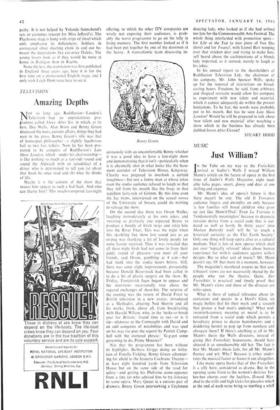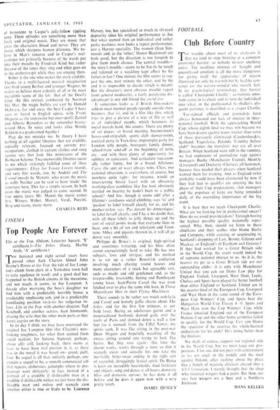MUSIC
Just William?
TNI the Tube on my way to the Freischiitz 'revival at Sadler's Wells I reread William Mann's article on the future of opera in the first issue of Sadler's Wells Magazine, eight read- able folio pages, smart, glossy and dear at one shilling and sixpence.
Mr. Mann's idea of opera's future is that there mayn't be one. The old 11 Trovatore audience lingers and dwindles on only because 'a few families still breed children who grow up just like Mum'n'Dad.' Even La Traviata is 'fundamentally meaningless' because its dramatic tensions derive from a social code that is out- dated as well as harsh. In thirty years' time Madam Butterfly itself will be 'as much a historical curiosity as the Flat Earth Society.' Only one thing will keep opera alive as a cultural medium. That is lots of new operas which shall put over 'topically relevant' ideas about human experience for with-it audiences against with-it designs. But to what sort of music? Mr. Mann doesn't say. Of that more in a moment, however.
The magazine's masthead assures us that con- tributors' views are not necessarily shared by the people who run the theatre. Quite. Der Freischiitz is practical and timely proof that Mr. Mann's views and those of the director are miles apart.
What is there of topical relevance about in- cantations and spooks in a Devil's Glen, six magic bullets that hit their mark and a seventh that proves a bad man's undoing? What mid- twentieth-century meaning or moral is to be extracted from a social code which permits a hereditary prince to decree banishments and a doddering hermit to pop up from nowhere and abrogate them? If there's anything at all in Mr. Mann's thesis the Wells directors, instead of giving Der Freischiitz houseroom, should have abjured it as unredeemable old hat. The fact is that Mr. Mann's thesis fails, for all Mr. Mann's fluency and wit. Why? Because it either under- rates the musical factor or leaves it out altogether.
Like many opera books that of Der Freischiitz is a silly bore, considered as drama. But in the opening scene listen to the women's derisive Tee- hee-hee chorus over the luckless, ill-used Max. And to the trills and high kicks for piccolos which at the end of each verse bring so startling a whiff
of brimstone to Caspar's jolly-fellow tippling song. These episodes are- something more than lively and original music. They are music that gives the characters blood and nerve. They are music which sharpens human dilemma. We be- lieve in Max's remorse and in Caspar's mal- evolence not primarily because of the words put into their mouths by Friedrich Kind but rather because of the tunes they sing and what goes on in the orchestra-pit while they are singing them.
Weber is the one who makes the story credible. Thanks to a multi-faceted musical imagination that fired young Berlioz and younger Wagner, he makes us believe most ardently of all in the most incredible scene of the lot: that of the Devil's Glen. (In this revival, conducted by Norman Del Mar, the magic bullets arc cast by Donald McIntyre. far and away the best Caspar I have seen or heard in English opera, with Frank Olegario as the impressive but over-spotlit Zarniel and Alberto Remedios as the somewhat brassy- voiced Max. In voice and looks alike Wendy Baldwin is a predestined Agatha.) Pray do not mistake me. In theory I have nothing at all against librettos that are credible, topically relevant, focused on current pre- occupations, clothed in current clothes and sung against sets that look like miniatures of the Barbican Scheme. Two memorable librettos occur to me which strikingly fulfilled some of these requirements: Elegy for Young Lovers (words, and very fine words, too, by Auden) and The Consul (words by Menotti. who wrote the music as well). Neither can be said to have 'made' the repertory here. This for a simple reason. In both cases the music was judged to come second. In true opera (pace Mr. Mann) the music comes Wit. Witness Weber, Mozart. Verdi, Puccini, Berg and many, many more.
CHARLES REID



































 Previous page
Previous page